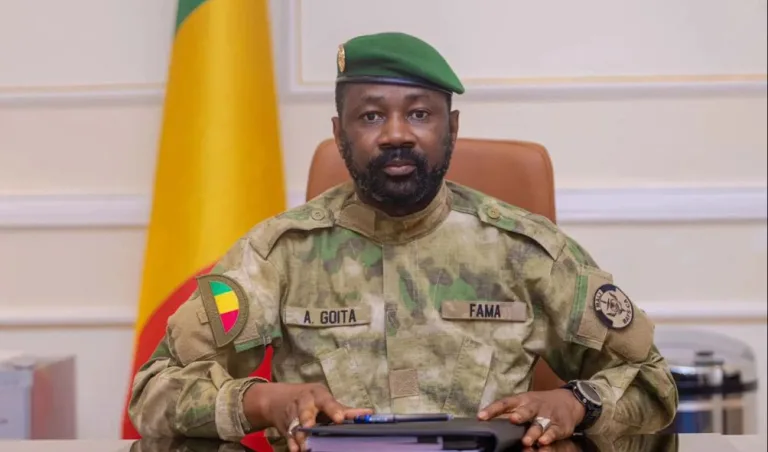Mali’s Interim President Assimi Goita Signs Law That Grants Himself Unlimited Presidential Term
Mali’s military leadership has officially extended the rule of coup leader Assimi Goita by five years — a term that can be renewed indefinitely without holding elections.
On Thursday, Mali’s transitional parliament approved the decision, allowing Goita to stay in power until at least 2030.
Malick Diaw, head of the National Transitional Council (NTC), called the move a “major step” in rebuilding the country. “The people support this decision,” he told AFP after the vote.
However, many critics see this as another attempt by Mali’s military rulers to tighten their grip on power and silence opposition.
ALSO READ:
- Inside Job Exposed: Kenyan Prison Wardens Convicted for Orchestrating Daring Terrorist Escape
- Uganda Pulls the Plug: Nationwide Internet Blackout Ordered Days Before Crucial General Election
- African Elections Under the Spotlight as Zambia Turns to Kenya Ahead of 2026 Vote
- “Two Drug Barons in Cabinet?” Kenya Government Fires Back as Ex-Deputy President Sparks Explosive Drug Claims
- Kenyan Court Freezes Use of Private Lawyers by Government, Sparks Nationwide Legal Storm
Goita took control after leading two coups — first in 2020, then again in 2021. At first, the military promised to hand over power to a civilian government by March 2024. That promise is now broken.
According to Mali’s state-run news outlet L’Essor and AFP, all 131 lawmakers present voted in favor of the new law. The NTC has 147 members in total and had already supported the bill earlier in April. The Council of Ministers backed it last month, and now only Goita’s signature is needed for it to become official.
The new rule says the transition period will last five years and can be extended “as many times as needed” until peace is restored. The changes also allow Goita and other government officials to run in future elections — something that was previously not allowed.
But many are raising red flags. The updated charter removed all mentions of political parties, raising questions about whether the military government plans to hold free and fair elections at all.
Last month, Mali’s military leaders dissolved all political parties and banned public gatherings. Rights groups say these actions are part of a growing crackdown on civil freedoms, as the military urges people to unite behind their leadership.
Growing Insecurity and Russian Support
When Goita became transitional president in June 2021, he promised to defeat armed groups and restore civilian leadership. But years later, the country is still battling extremist violence, and no elections are in sight.
Since 2012, Mali has faced ongoing attacks from groups linked to al-Qaeda and ISIS, along with criminal gangs. The violence has worsened in recent weeks.
Mali’s army, along with Russian mercenaries from the Africa Corps, has been accused of committing human rights abuses while fighting insurgents.
Together with Burkina Faso and Niger — two other countries run by military governments — Mali has formed the Alliance of Sahel States (AES), a joint military coalition of 5,000 troops.
All three nations have cut ties with former colonial power France and are turning instead to Russia for support.
Goita also pulled Mali out of ECOWAS, the West African regional bloc, after it demanded that Mali return to democratic rule. Burkina Faso and Niger followed the same path.
Goita first came to power by removing then-President Ibrahim Boubacar Keita, following massive protests against his leadership and his failure to stop the spread of violence.
But despite his promises, armed attacks in Mali have only increased under Goita’s rule.
Mali’s Interim President Assimi Goita Signs Law That Grants Himself Unlimited Presidential Term
